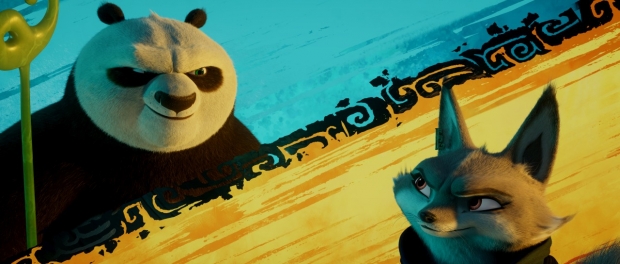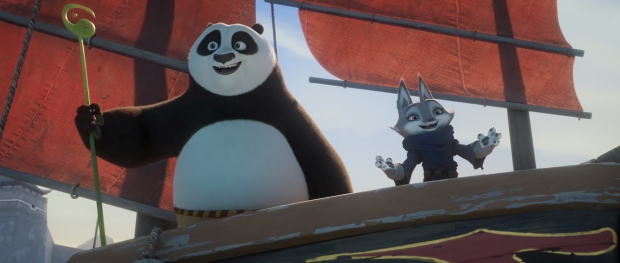The award-winning actors behind the film’s eventual dynamic duo of Po and Zhen discuss the appeal of voice acting, their creative process, and what was most challenging in the booth; DreamWorks Animation’s all-new ‘Kung Fu Panda’ adventure hit theaters today, March 8.

DreamWorks Animation’s ‘Kung Fu Panda 4,’ coming to theaters today, March 8, 2024. All images courtesy of DreamWorks Animation.
When you hear the name, “Jack Black,” several iconic images immediately come to mind. A teacher with a bad haircut holding a righteous electric guitar, a mustache and red cape-wearing wrestler wooing a catholic nun, and a big, fluffy, dumpling-loving panda with quite the ‘Skadooshy’ uppercut.
Po, the hero of DreamWorks Animation’s Kung Fu Panda franchise, has been award-winning actor and musician Black’s longest-running role. Black first voiced for Po in 2008 and has continued to bring life to the Dragon Warrior for the second and third movie, as well as the three short films – Secrets of the Furious Five, Secrets of the Masters, and Secrets Of the Scroll – as well as the TV series, Kung Fu Panda: The Dragon Knight. It was this series that earned Black his first-ever performance award, the Children's and Family Emmy for Outstanding Voice Performance in a Children's or Young Teen Program.
Now, Black, joined by equally iconic Golden Globe-winning actor Awkwafina, returns to the role in the franchise’s latest film, Kung Fu Panda 4, which releases in theaters nationwide today, March 8.
In the film, directed by Mike Mitchell and Stephanie Ma Stine, Dragon Warrior Po, ever unsure about his unmatched courage and mad martial arts skills, is called upon by destiny to become the Spiritual Leader of the Valley of Peace. Po needs to quickly find and train a new Dragon Warrior before he can assume his new lofty position. On top of it all, trouble lies ahead with a recent sighting of a wicked, powerful sorceress, Chameleon (played by Oscar winner Viola Davis), a tiny lizard who can shapeshift into any creature, large or small. And Chameleon has her beady little eyes on Po’s Staff of Wisdom, which would give her the power to re-summon all the master villains whom Po has vanquished to the spirit realm.
Po finds help in a crafty, quick-witted thief Zhen (Awkwafina), a corsac fox who really gets under Po’s fur' but whose skills will prove invaluable. In their quest to protect the Valley of Peace from Chameleon’s reptilian claws, Po will discover that heroes can be found in the most unexpected places.
We got the privilege to talk with Black and Awkwafina about their roles, the reason they both continue to embrace voice acting in a variety of animated projects, why Black thinks he’s the most annoying guy in the recording booth, and how Awkwafina relates more to Zhen than any character she’s previously played.
If you’ve got a few extra minutes, take a look at our 12-video playlist, “The Kung Fu Panda 4 Video Skadoosh-athon,” for some deep dives into the film.
Dan Sarto: I was at the premiere on Sunday. Jack, you dropped some great moves and fine kicks in front of the audience. I've been in this business almost 30 years and this has been a great franchise to follow. Your work, along with the studio's work, is just exemplary. So, job well done for both of you.
Jack Black: Dude, thank you. And you enjoyed the film, yeah?
DS: Absolutely. And I don't enjoy many of them.
JB: So that's high praise.
DS: I'm curious, how often were you guys able to record together? As veteran voice actors, does that make for a better performance?
JB: We only recorded together. No. I'm lying. We only recorded together once.
Awkwafina: One time, yes.
JB: It was one time, but it was so funny and good that we were both like, ‘We should do this more often.’ But, for the most part, they like to get us isolated just because they are able to be more productive and drill down on moments whereas, if there was another actor there waiting for you to finish drilling, they'd be like, "Oh, can we get to my line please?" That's just the nature of the beast. But we did get to jam and riff that one day and that was pretty dang funny.
Awkwafina: It was so funny.
DS: Jack, I imagine you slip into the Po headspace pretty easily. Awkwafina, this was a new role for you, even though you're a veteran voice actor as well. What type of prep did you do for the role of Zhen?
Awkwafina: Well, I think she kind of speaks for herself and I really love the way that she was written and how she bounces off Po's narrative. I think that, looking at my voice acting history, Zhen is probably the one who is most like me of all the characters I’ve played. There's a seriousness to her that I don't think I do often in the animation world, which I really enjoyed watching.
DS: And that seriousness, by playing off the humor and the snarkiness, gives more weight to the seriousness.
Awkwafina: Definitely. Yes.
DS: That nuance was done very well in the film, and it's not often done very well in animation, which tends to just bounce from one extreme to the next.
Awkwafina: Right. Yeah. Thanks for saying that.
DS: I know, in talking to directors who work with talent like you two, they'll often marvel at how actors can take the same line and do it 20 different ways with 20 different nuance takes that give them a lot to work with when they're finally animating with it. Tell me a little bit about that process. How much ad-libbing do you guys do?
JB: I like to riff, but I like to get it how it's written first, get a few takes under the belt until everyone's real happy. And then I like to annoyingly say, "Wait, let me try a couple of other different ways and keep on going." I don't like to leave any stones unturned, so I just explore until I feel like I've done everything, or until the editor's like, "We've got to move on."
Awkwafina: There are certain directors and projects where you just really need the scripted line and it's very specific. And then other people, like Mike and Stephanie, encourage a playful kind of environment. If they don't want to improv, why even do that? But they did on this movie.
DS: You guys are also so prolific in the live-action world. When people stop you or when people talk to you about your work that they've appreciated, how much do they reference the animation stuff that you've done?
Awkwafina: That's a really interesting question.
JB: I get a lot of Kung Fu Panda love and there's a deep appreciation for the animated films. I don't know what the percentage of compliments are, but I'd say it’s 50-50. Whether it's animated, live-action, or whatever, people, if they're moved by a movie, they want to let you know about it.
Awkwafina: I like it when kids recognize my voice from certain things. That always makes me really happy.
DS: What creative itch does voice acting scratch for you both that live action doesn't?
JB: I do love the more relaxed environment of an animated set where you can do as many takes as you want. That's a luxury. You never feel that kind of relaxation on the set of a live-action film where time is money and there's a tremendous amount of pressure to nail it in one or two takes. And it's also fun to just riff back and forth with the directors and try tons of different approaches and improvs.
Awkwafina: And it's really the ultimate transformative experience. In what other medium could you literally be an animal or inhabit a completely different body? It's one of those really wild places that I think is really cool and transformative.
JB: It's also cool to have the collaboration with the artists because they're doing a lot of acting too, just through their animated facial expressions and that stuff. They really take your vocal performance and carry it over the finish line.
DS: Last quick question. When I talk to folks in the business, I often ask, ‘What was the most challenging part of your work on this project?’ When I talk to the voice actors, not to trivialize the work, but they always say, "This is a dream job. This is easy for me." What's the toughest part of your work on a film like this where there are 500 or 600 artists working to put you up on the screen?
JB: To me, the hardest part is continuity and just knowing where we are in the story. I know I'm annoying, but I'm often like, "Okay, sorry, but what happened right before this moment?" And I also have this habit where I like to read everything on the page leading up to it, including all the stage directions, just to be able to put myself in the world and in the emotive state. And I need tons of reminders of those things and story arcs because you don't have the whole script there in front of you like in a live-action film where every day you're going over each scene. So, it's incumbent upon you to ask and make sure you are aware of where you are in the arc for an animated movie.
Awkwafina: I wouldn't say that's annoying, Jack. I'd say that's a good process and that you're collaborative.
JB: Well, I guess that's a question for Mike and Stephanie. I don't know if they'd be honest with you, but I swear I saw some annoyance in their eyes.
Awkwafina: I happen to appreciate it.
DS: I actually asked Mike and Stephanie if the animators put their pictures up on dartboards because of the ridiculous amount of animation that went into this film. Listen, our time is up. But, again, fantastic job.
Awkwafina: Thank you for that thoughtful interview.
DS: We're not People Magazine… this is a really good film, and you guys did a really good job, and I wish you success.
JB: Thank you, Dan.
Awkwafina: Thank you.
Dan Sarto(link sends e-mail) is Publisher and Editor-in-Chief of Animation World Network.











